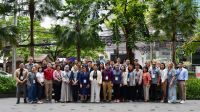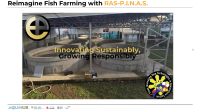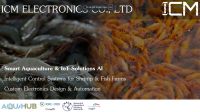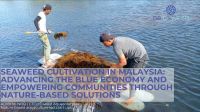A networking and coaching event for aquaculture entrepreneurs and startups was held in Bangkok from 12-19 May. AQUAINNOVATE brought together promising startups to pitch their ideas, network, and participate in expert coaching circles.
Convened by NACA and FutureFish with funding support from Canada's International Development Research Centre, the programme included sessions on business fundamentals, investing for impact, nature and community based business innovations, and interactions with experts from the the National Innovation Agency, Center of Excellence for Shrimp Molecular Biology and Biotechnology, the National Center for Genetic Engineering and Biotechnology, and Mahidol University.
AquaInnovate was an immersive AquaHub networking and coaching event for aquaculture entrepreneurs and startups was held in Bangkok from 12-19 May. AQUAINNOVATE brought together promising startups to pitch their ideas, network, and participate in expert coaching circles.
Convened by NACA and FutureFish with funding support from Canada's International Development Research Centre, the programme included sessions on business fundamentals, investing for impact, nature and community based business innovations, and interactions with experts from the the National Innovation Agency, Center of Excellence for Shrimp Molecular Biology and Biotechnology, the National Center for Genetic Engineering and Biotechnology, and Mahidol University.
The programme included visits to local farms that are driving innovation and leading the industry, panel discussions on the aquaculture startup ecosystem and nature-based seafood markets and creative partnerships.
Elisa Claire Sy of E-Primate presents RAS-P.I.N.A.S, a closed-loop, water-efficient system for land-based fish farming. The technology integrates biofiltration, aeration, and mechanical treatment to support high-density production while conserving water and land and reducing disease risk. RAS-P.I.N.A.S also offers flexibility in farm siting, with trade-offs in energy use and infrastructure costs. Recirculating aquaculture systems are gaining traction as a key innovation in Asia’s sustainable aquaculture future.
Green Controller by ICM Electronics is a smart water quality monitoring system for aquaculture, powered by high-precision titanium sensors. It tracks dissolved oxygen, salinity, and pH in real time, with full control through a mobile app and instant anomaly alerts. The system enables automated aeration based on live data, reducing energy use, lowering aerator run time, and improving feed conversion efficiency for more sustainable aquaculture operations. This pitch was presented Sukmit Teekhasenee of ICM Electronics.
Cweed Aquasolutions, a spin-off from Universiti Malaya, works with coastal communities to develop seaweed cultivation through integrated multi-trophic aquaculture. The initiative repurposes abandoned shrimp ponds in Peninsular Malaysia, providing training and technical support for farmers to start seaweed farming. Cweed Aquasolutions also buys back harvested product, creating a sustainable livelihood model that links community development with nature-based aquaculture solutions. This pitch was presented Adibi M. Nor, CTO of Cweed Aquaculture Solutions.




